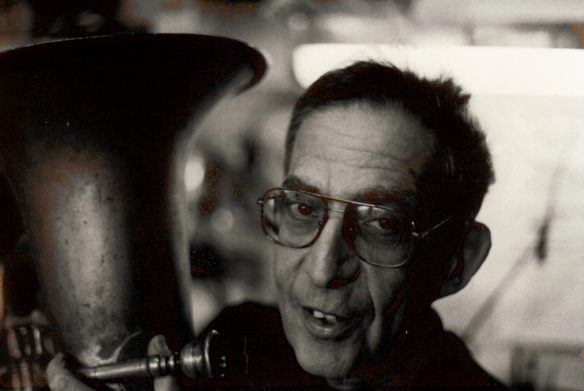
Richard Lupoff, known to friends as Dick, died October 22 at the age of 85. His sons Tom and Ken announced on Facebook:
My dad passed away early this morning in the hospital after a brief final illness. It was peaceful. And despite severe pandemic visitation restrictions my brother and/or I were allowed to be with him at all times so that he was not alone and we got to say proper goodbyes.
A longtime fan who worked as a technical writer, or when feasible a full-time sf pro, Lupoff with his wife Pat (and Bhob Stewart) edited the Hugo-winning fanzine Xero. They were among the founders of the Fanoclasts, and of New York’s Eastercon. Dick participated in APA-F and the New York Futurian Society. As a pro, he produced 20 novels and enough short fiction to fill several collections. He edited hardcover editions of Burroughs books, wrote a biography of Burroughs, and other nonfiction books drawing on his expertise in pulp, comics and sf history.
Lupoff already was an avid sf reader when he encountered fandom in 1952 via Amazing Stories. “And suddenly I discovered a subculture of people who valued the intellectual over the physical, ideas over objects, imagination over conformity, cooperation over competition.” He decided the fastest way to become part of that world was to publish a fanzine, even though the only means of production available to him was to type each page on a sandwich of original and carbon paper. Once he had made eight copies of a zine he called SF52 he sent them to the leading faneditors of the day. A single recipient – Lee Hoffman – wrote back, which encouraged him to stick around.
In contrast to most fans, Lupoff was already a selling writer by the time he got involved. As a 14-year-old he was earning pocket money as a stringer for metropolitan newspapers, filing stories on prep school sports with the New York Times and Herald-Tribune, the Philadelphia Inquirer and Bulletin. Later, while an undergraduate at the University of Miami, he wrote news items for the Coral Gables, Florida, Times, and for WIOD, Miami’s 6:00 o’clock news five days a week. “It was like living in a movie,” he remembered.
After college and a two-year hitch as a conscript in the U.S. Army, he was hired as a technical writer for what was then Sperry Univac at a salary of $350 a month. This enabled Dick and Pat Lupoff to marry in 1958. They lived in Westchester County just north of New York City, where “it was possible for a young couple to lead a very pleasant upper-middle-class life on that salary.”
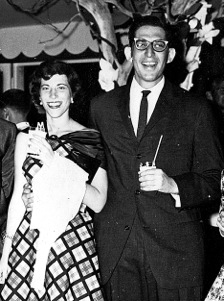
He was impressed by his first sight of a computer:
Univac I. It had 1000 *words* of memory, roughly the equivalent of 12K bytes. The storage medium was a mercury delay line, and if you wanted to look at the memory you had to open a door in the side of a garage-sized metal structure and walk inside. It held half a dozen people comfortably.
He worked for Sperry for five years, then IBM for seven. The last several years at IBM were spent writing and directing movies. In the evenings and other free time he wrote. His first book, Edgar Rice Burroughs: Master of Adventure, came out in 1965, and his first novel, One Million Centuries, in 1967.
Lupoff said that first novel and his fiction-writing career generally was helped with a push in the right direction from Andrew Porter:
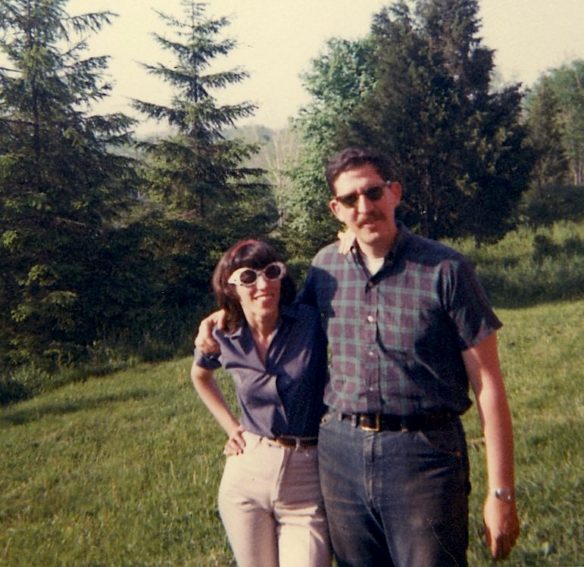
FWIW, I want to offer a tip of the tam to Andy Porter. In 1965 I brought out my first book. It was nonfiction. I kept saying that I was going to write a novel but I kept stalling. Finally Andy took the train from New York City up to Poughkeepsie, where Pat and I were living at the time.
He kept pressuring me to stop talking about writing a novel and for heaven’s sake sit down and write. I finally did, and the result was One Million Centuries, certainly not an “Eighty-Yard Run” quality effort, but a respectable novel which went through a couple of editions (Lancer, later Timescape/Pocket) and got my career as a fiction writer rolling.
If it hadn’t been for Andy, I might have spent the next thirty years writing computer manuals and regretting what-might-have-been.
Andy, did I ever thank you for what you did? Probably not. So even at this very late date, and in front of the large and distinguished audience that we call Fictionmags — Thank you!
But it wasn’t until 1970 that, with Pat’s support and encouragement, he went full-time as a pro sff writer. His work was well-received. His novella “With the Bentfin Boomer Boys on Little Old New Alabama” in Harlan Ellison’s Again, Dangerous Visions was a Nebula nominee (1973). He earned two Hugo nominations for his short fiction, “After the Dreamtime” (1975), and “Sail the Tide of Mourning” (1976 – a Nebula nominee, too). His books during the decade included Sacred Locomotive Flies (1971), Into the Aether (1974), The Triune Man (1976), and two Buck Rogers novels under his Addison E. Steele pseudonym. His entertaining collection of parodies on other sf authors, The Ova Hamlet Papers came out in 1979.
During that period he also wrote the short story “12:01 P.M.” (1973), adapted as the Oscar-nominated short film 12:01 pm (1990) and the TV movie 12:01 (1993). (Lupoff appeared in both films as an extra.) The major plot device is a time loop, so similar to that of 1993’s Groundhog Day that Lupoff and Jonathan Heap, director of the 1990 film, were “outraged” by the apparent theft of the idea, but “After half a year of lawyers’ conferences and emotional stress, we agreed to put the matter behind us and get on with our lives.”
An economic downturn at the end of the Seventies affected Lupoff’s markets and pushed him back into the workforce for a few years. But when given the opportunity to write full-time again, he said he found “The lesson that I had to accept was that the field had moved on, leaving me behind. It’s painful to say this, but it was nonetheless true.” However, he was able to rebrand himself as a mystery writer, and in that genre he enjoyed fresh success with The Comic Book Killer, featuring the detective team of insurance investigator Hobart Lindsey and Berkeley police officer Marvia Plum. That was followed by The Classic Car Killer, The Bessie Blue Killer, The Sepia Siren Killer, and (coming in 1995) The Cover Girl Killer.

By the start of the 21st century, Dick and Pat Lupoff, who had raised three children, also were looked on as the lineal ancestors of comics fandom, a fact they celebrated by publishing a book of selections from their famous fanzine, The Best of Xero (2004) – which was, in turn, nominated for the Best Related Book Hugo (2005). John Hertz’ review describes the fanzine’s early days and names some of the well-known contributors:
Pat & Dick Lupoff typed stencils in their Manhattan apartment, printed them on a machine in Noreen & Larry Shaw’s basement, collated by hand, and lugged the results to s-f cons or stuffed them in mailboxes. The machine had not been given by Damon Knight, A.J. Budrys explained in a letter after a while, but lent. Eventually drawings could be scanned by electro-stencil, a higher tech. Colored ink joined colored paper, sometimes wildly colored. Xero could be spectacular.
…You’ll also see Anthony Boucher, Harlan Ellison, Ethel Lindsay, Fred Pohl, Rick Sneary, Bob Tucker as “Hoy Ping Pong”, Harry Warner — fans and pros mixing it up. Roger Ebert, later a movie critic, contributed poetry, often free-style, or formal and funny…
Even before starting Xero, the Lupoffs paid tribute to comics in their iconic costumes for the 1960 Worldcon masquerade, as Mary Marvel and Captain Marvel.
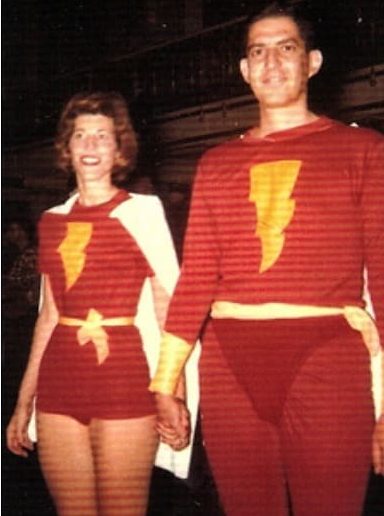
Pat Lupoff died in 2018. Dick was in Assisted Living these last few years, but still got around. He was a fixture at the annual Paperback Show in LA (see the photo of him at the 2019 event), one of the many places his absence will be felt.
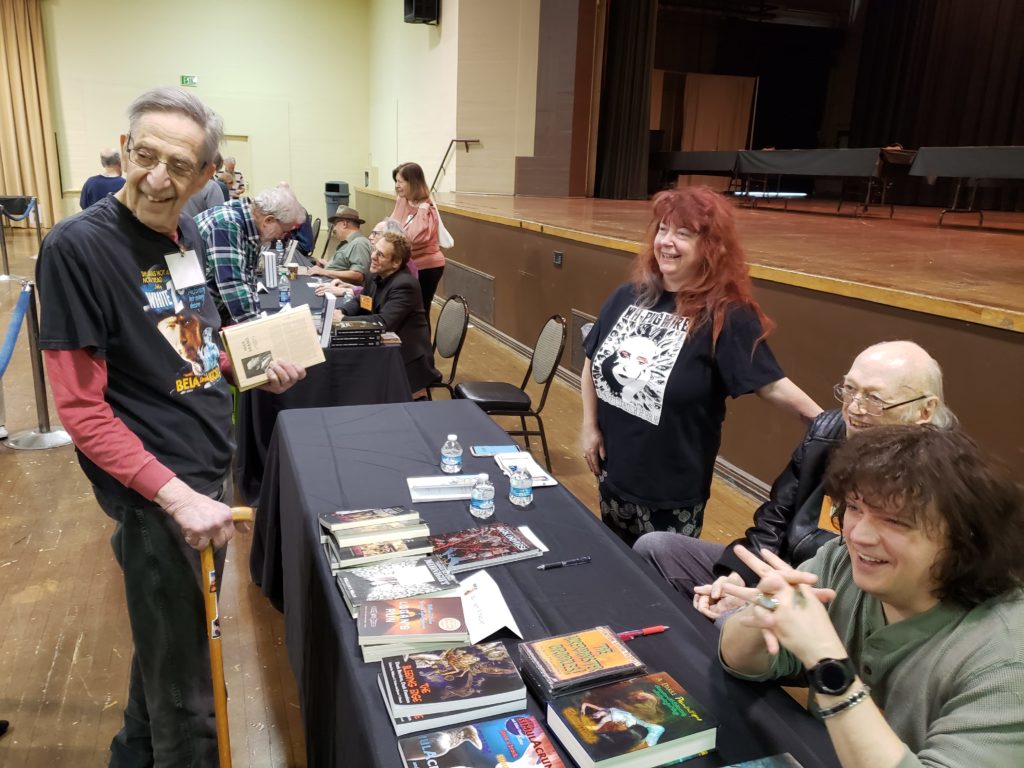
Discover more from File 770
Subscribe to get the latest posts sent to your email.

My gateway to the work of Richard Lupoff was the books All In Color for a Dime and The Comic-Book Book, two non-fiction books he co-edited in the 1970s with Don Thompson of the Comics Buyer’s Guide.
Lupoff’s pro and fan activities were so varied and successful that it’s hard to decide which role deserves the most prominence. He was a science fiction author/fanzine publisher/mystery writer/genre historian/radio host/book reviewer/anthologist. I didn’t know the last one until I just looked at his bibliography. He edited two volumes of the intriguingly titled What If? Stories That Should Have Won The Hugo.
My condolences to the friends and family of Richard and his wife Pat.
A fine guy, a founder of a greater fandom.
Agree, What If? Stories That Should Have Won The Hugo is a great set of stories.
Sad, the giants dying…
Nice write-up, Mike. Dick was definitely a good guy.
The cancelled third volume of What If? was finally published a few years ago. Here’s the publisher description:
“Back in the 60s and 70s writer Richard A. Lupoff knew his SF. He knew it so well he put out two books called WHAT IF? each consisting of stories that were eligible for Hugo awards and in his opinion should have won. He had a third volume in this fascinating series ready to go, but technical problems caused it to never see the light of day — until now. Here it is, the legendary third volume in the WHAT IF? series, personally introduced by Richard A. Lupoff. The stories are: LIGHT OF OTHER DAYS — 1966 Bob Shaw, THE STAR-PIT — 1967 Samuel R. Delany, THE BARBARIAN — 1968, Joanna Russ, SUNDANCE — 1969 Robert Silverberg, THE ISLAND OF DOCTOR DEATH AND OTHER STORIES — 1970 Gene Wolfe, VASTER THAN EMPIRES AND MORE SLOW — 1971 Ursula K. Le Guin, PAINWISE — 1972 James Tiptree, Jr., MY BROTHER LEOPOLD — 1973 Edgar Pangborn.”
What a line-up!
The sf field might have passed Lupoff by in the 80s, but in 1974 he was ahead of it with one of the novels mentioned in this piece – the photo-cyberpunk INTO THE AETHER, which featured “the Chester A. Arthur, the world’s first and only coal/steam/paddlewheel-propelled spaceship”.
I was (socially) young and foolish when I knew Dick in the late 60s/early 70s, but enjoyed very occasional gathering where he was involved, and he facilitated my acquiring his Edgar Rice Burroughs: Master of Adventure from Canaveral Press. I recall enjoying some of his fiction later on, but didn’t acquire much. A few years ago he asked me if I was interested in working with him to illustrate some project and I wistfully and regretfully warned him I was bad about keeping up with project deadlines; I didn’t hear from him again.
Thanks, Mike for the write-up and charming photos.
Dick Lupoff was a good friend. I enjoyed the time we spent together. He was full of stories. At one point we discussed an anthology I wanted to edit. He was supportive, but as it turned out I just didn’t have the time. His Assisted Living apartment was fairly near to our house and I always meant to stop by. I’m sorry I never made it.
I will miss him deeply.
I didn’t realize that Mr. Lupoff was SF before he was mystery — I found him with The Comic Book Killer, and I think I read a couple other of his mystery novels. RIP Richard Lupoff. Very glad his sons were able to be with him.
Good write-up, Mike. Glad you could use some of my photos, and other stuff.
I’d like to point out that the first several issues of XERO were mimeographed on my mighty QWERTYUIOPress, before the Lupoffs moved to Larry & Noreen Shaw’s Rex Rotary.
More important, Dick wrote all his “Ova Hamlet” stories for me, at my urging, for publication in FANTASTIC.
Ah man. I was trying to track him down for the cosplay book. Sad to see he’s passed.
After knowing Dick and Pat back east I was happy to run into them again in Berkeley, living a little way from us, with Pat running a nice little antique store. As often happens, people you live near often don’t get to hang out, so in recent years I ended up seeing Dick at events that connected us back, like celebrations of Avram Davidson. I didn’t know that Pat had passed, but last time I saw Dick he seemed the same enthusiastic fan at heart that I first knew in the late 50s, early 60. I will miss him. I think everybody who knew him will miss him.